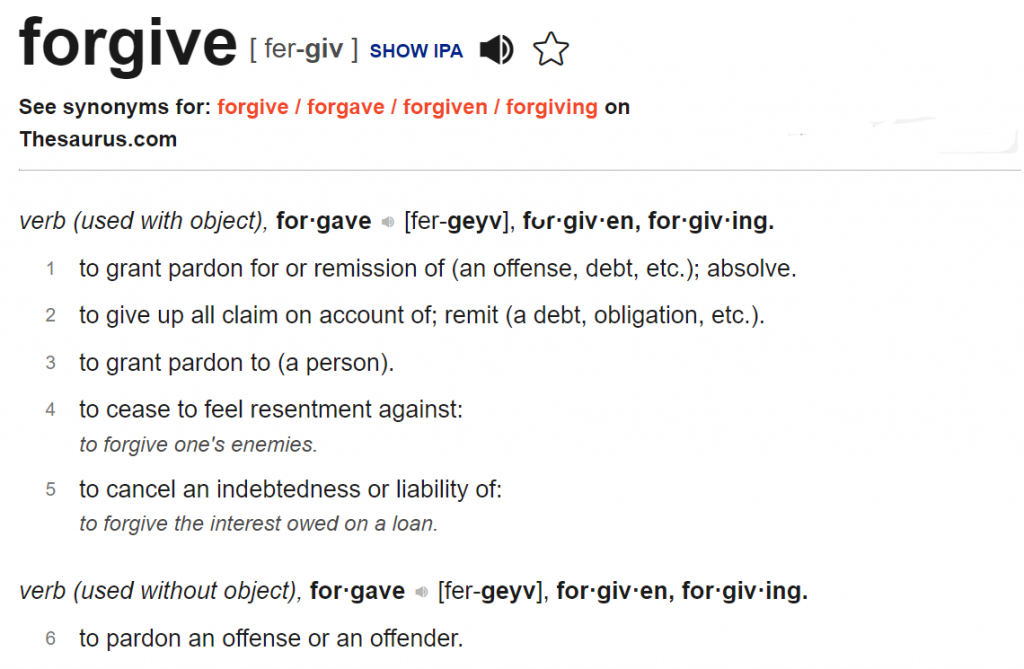Forgiveness has been spoken about for centuries by most faiths and great teachers around the world as the way to peace and happiness. We’ve understood the power of forgiveness in psychology and health for decades. It’s such a common concept it has become a cliche. This can be a problem given the old proverb: “Familiarity breeds contempt.”
If forgiveness is so important, why is it so hard for us to forgive?

This is a HUGE topic. I’ll keep it as short as possible so you can get right to the recorded process in this article and find more peace and happiness right now. That’s what this blog is about!
Here’s just 2 key points I’ve found in my experience working with hundreds of people on forgiveness:
1. Most people really don’t understand what the word “forgive” means so they can’t access forgiveness.
2. We weren’t taught how to forgive. It’s a process, not a chance occurrence. Few have ever been taught HOW to do it.
(Below is a link to a recorded process to actually forgive right now!)
1) First, let’s understand the word:

Consider what it means to “forgive” a loan you have made to a friend. You say, “You don’t OWE me anything.” You don’t require the money back because you are already whole and you don’t “need” the money. You are not damaged by letting the money go. In fact, you learned about lending money to people that can’t handle money. You are wiser from the mistake. You can forgive the debt AND decide to no longer lend money to the friend because they just don’t have the skill to use what you gave them. In other words, we can forgive when we are strong, not believing we are destroyed by the other person.
To “forgive” means to give up the desire to punish! To cease to feel resentment against. It does not mean to “condone”. That’s why we have two words. They are different. Forgiveness is about setting your soul free from constant thoughts of the other person or our story of what happened. It has nothing to do with them or their behaviors.
Forgiveness is finally letting the prisoner out of jail and realizing all along, the prisoner was YOU.
Unforgiveness is like continually drinking poison to try and hurt the other person.
Pause here, close your eyes, really imagine you as a prisoner, feeling the prison of pain you have put yourself through all these years… and imagine letting yourself out from behind the bars notice how that feels, right now.
Often, the person we TRULY are not forgiving is our self, blaming our self for our mistake in “letting” something happen. I encourage you to watch this 4 minute scene where the writers capture our human pain of being hurt but not truly forgiving ourselves.
Recent university research shows that negative thoughts can prolong and double healing time. Negativity can kill us. Unforgiveness of parents can get in the way of healthy relationships. Forgiving past lovers and bosses. Forgiving our self for the mistakes we’ve made. The list is long. Now you see why forgiveness is so important.
2) HOW do we forgive? Now that we get that forgiveness only means letting go our resentment feelings, our grudge, so that we can be healthy, take care of our cells, and live a happy life… how do I do it?
Well you’re in luck! One of my NLP teachers and colleagues has made available a recording he did from modeling a shaman and many years of working with successful forgiveness.
Click here to get this powerful 20-minute recorded process by one of my teachers. Look for the “download MP3” next to the audio player. Make a quiet time to close your eyes and really go deep in the visualization.
Like healing from an torn muscle, the heart muscle deserves regular therapeutic exercise to heal and become strong again. Do this process over and over again until you really FEEL free of the hook and pain.
This is why I love Neuro-Linguistic Programming (NLP). It’s the HOW of a successful life. Real processes for real change! Let me hear your experience. We’ll talk more about forgiveness in future articles.e
Leave a Reply